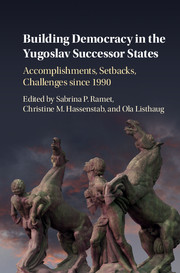 Building Democracy in the Yugoslav Successor States
Building Democracy in the Yugoslav Successor States Book contents
- Frontmatter
- Dedication
- Contents
- List of Boxes
- List of Figures
- List of Tables
- Notes on Editors
- Notes on Contributors
- Preface
- Part I Introduction and Theory
- Part II Country Studies
- 7 Building Democracy in Serbia: One Step Forward, Three Steps Back
- 8 Building Democracy in Croatia since 1990
- 9 A Durable Oligarchy: Bosnia and Herzegovina's False Post-War Democratic Transition
- 10 Liberal Democracy in Slovenia: From Seventh Heaven to the Lobby of Hell in Only Two Decades?
- 11 Macedonia's Post-Yugoslav Reality: Corruption, Wiretapping, and Stolen Elections
- 12 Building Democracy in the Western Balkans: The Case of Kosovo
- 13 The Trajectory and Parameters of Democratic Transition in Montenegro
- 14 Building Democracy in Vojvodina
- Part III Conclusion
- Further Reading
- Index
9 - A Durable Oligarchy: Bosnia and Herzegovina's False Post-War Democratic Transition
from Part II - Country Studies
Published online by Cambridge University Press: 25 May 2017
- Frontmatter
- Dedication
- Contents
- List of Boxes
- List of Figures
- List of Tables
- Notes on Editors
- Notes on Contributors
- Preface
- Part I Introduction and Theory
- Part II Country Studies
- 7 Building Democracy in Serbia: One Step Forward, Three Steps Back
- 8 Building Democracy in Croatia since 1990
- 9 A Durable Oligarchy: Bosnia and Herzegovina's False Post-War Democratic Transition
- 10 Liberal Democracy in Slovenia: From Seventh Heaven to the Lobby of Hell in Only Two Decades?
- 11 Macedonia's Post-Yugoslav Reality: Corruption, Wiretapping, and Stolen Elections
- 12 Building Democracy in the Western Balkans: The Case of Kosovo
- 13 The Trajectory and Parameters of Democratic Transition in Montenegro
- 14 Building Democracy in Vojvodina
- Part III Conclusion
- Further Reading
- Index
Summary
Nearly a quarter-century after its first multiparty elections and two decades following the end of a wrenching war, Bosnia and Herzegovina (BiH) is the most problematic laggard in the region in terms of its progress toward the Euro-Atlantic mainstream in democratic and economic development. Why is this so? Why does an ostensibly democratic country demonstrate such a disconnect between the concerns of a majority of its citizens – of all self-identifications – and its political leadership? Is BiH really a case of “building democracy” or “transition” at all?
This chapter will attempt to answer these questions. It shall build upon the work of the multiple authors of Bosnia-Herzegovina Since Dayton: Civic and Uncivic Values, one of the several volumes in the series to which the present volume serves as a capstone. The chapter shall focus on a number of themes included in the book, and touch upon several others. Political parties, democracy, elections, and electoral participation – all themes woven throughout this volume – are inextricably linked to the constitutional structure of the state, which is central to the author's contention that BiH is not actually a functioning democracy at all, but rather a competitive electoral oligarchy run by elites who ensure they remain unaccountable. The position and posture of the “international community” has also been a determining variable. Nationalism, the economy, poverty, corruption, the nature of privatization, the lack of rule of law, intolerance, and the media all play supporting roles in explaining the current dynamic – or are resultant from it.
Political Development
To a greater extent than any other post-Yugoslav state, the democratic development – or lack thereof – of Bosnia and Herzegovina (BiH) was determined by violent conflict and its outcomes. This chapter will begin with a brief reflection on the 1992–1995 war and the first multiparty elections in 1990 which preceded it.
The November 1990 elections saw nationalist parties – the Muslim (later Bosniak) Party of Democratic Action (SDA), the Serb Democratic Party (SDS), and Croatian Democratic Union (HDZ) – dominate the vote (more than 70 per cent collectively), sweeping aside the League of Communists of Yugoslavia and the Alliance of Reform Forces. The three victorious parties formed a government.
- Type
- Chapter
- Information
- Building Democracy in the Yugoslav Successor StatesAccomplishments, Setbacks, and Challenges since 1990, pp. 216 - 255Publisher: Cambridge University PressPrint publication year: 2017
- 3
- Cited by
